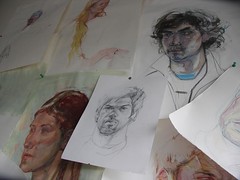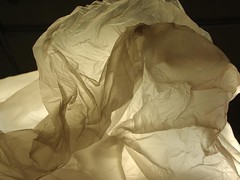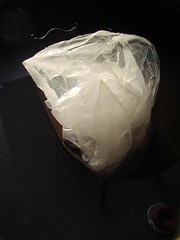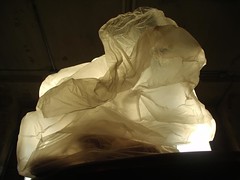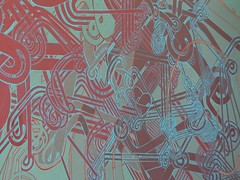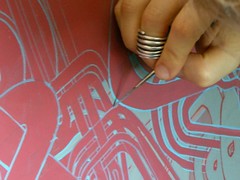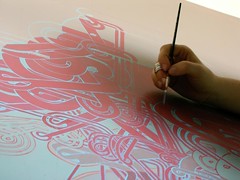An Introduction:
This I wrote as a gift, not to a person, but to many. Truth is, nothing in particular was planned for Easter this year; at least not among my clan of folk. Needing any, oh please... any excuse to meditate, I decided to write an essay-as-gift to my day-in, day-out community.
So I began with an old journal entry, marked April of 2004 and grafted into its timeless topics some current thought and feeling. It’s a bare-fisted piece, whose honest punch is choreographed by an equally honest love of images and words. I expect the duck and weave of it all might dizzy some... but I mean well. I want to communicate.
Words are but one means of that. Could be that I am more fluent in visual then verbal language, so I have tried that too, and transposed this essay into a large drawing/collage.
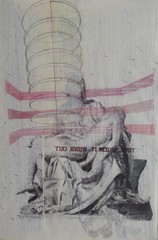
Three full drafts of the essay are incorporated in the drawing, as well as a collage of 'The Pieta" and other images suggested by the writing.
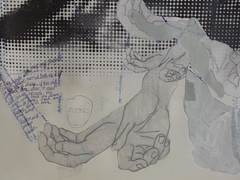
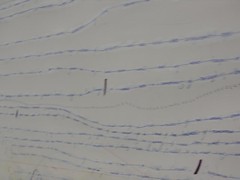
Some things need a threadbare excuse. I wanted to let Easter this time round change me, but such change is not passive. I needed to need it, and then needed to try for it.
Perhaps the truths of my motives are more simple then even that: it is difficult to think on God, even more difficult to give Him my doubts and ultimate trust. So He and I were in need of a little arm wrestle. I had no hope of victory; besides, with Him I always want to loose.
-------------------------------------------------------------------------------------------------
Time, When It Runs Out
This Good Friday will be an event.
House churches have asked their members of creative leaning to each interpret a station of the cross in order to create an interactive installation. We last-minute workers are scattered around the echoing sanctuary variously gluing, hammering, hanging, painting… the night is late.
I have been thinking it out carefully, wondering what it is that I will make for the station assigned to me. From among the many stations traditionally celebrated, those responsible for cobbling together this annual celebration did not think it best to give me, oh, say ’Veronica Wiping Christ’s Brow’, or ‘Christ Stumbling Under the Weight of the Cross’… no, instead I was told to represent the moment of His actual death.
You just go a head and try to communicate the Death of God with plywood and house paint. Impossible.
But I had time. And fortunately I was rational enough to realize that my little project wouldn’t be responsible for conveying the vast scope and scandal of Christ’s physical death…no, a dynasty of historic interpretation had handled the topic quite well, thank you. Many artists have applied themselves to this astonishing event, and each has succeeded in communicating different facets of this act of Divine risk with whatever grace of talent and understanding that they had been given.
My contribution would be an all but invisible footnote. Emboldened by anonymity, I start-in.
Death and culpability are my subjects; hammers, house paint, plywood, hands, these are my tools… and a little research. Needing a very particular statistic, I hunt for a number: 195 inmates on death row in Ohio. Then I collect mirrors, some of them I break. With India ink, a calligraphy pen and very formal handwriting, I script names - Stanley Adams through Kevin Yarbough - directly on bits of glassy mirror. My own face looks back at me, tattooed with names of the condemned. Finally I arrange these labeled mirrors on the walls of a small freestanding cubical, painted black and claustrophobic. Visitors step in, and the curtain falls shut behind.
I guess I’ll call it ‘Substitution’.
But when the Friday that is mysteriously called ‘Good’ finally dawned, my questions and I sat in the furthest corner from that black cubical.
God, why must you be remembered? Why must we sit in these tall buildings on special days wearing long faces? Why must we whisper? Can’t you compete with the desperate holler of the world? Surely You can make Yourself heard over the clang and clamor of it all. So why all this arranged sentiment and sobriety?
How do we find you? Is it now? I am here, the stained-glass glistening in guttering candle-light, it is Good Friday, majestic music swells in the sanctuary, plaster angels lean expectantly from their niches, and my soul is about as animate as a lump of soap, lead, stone… take your pick. I cannot muster a thing.
I walk the five blocks home, aware of little other then the gum-wrappers and beer cans on the sidewalk, abstractly observing my feet find their way to my address.
Trying to sleep, I watch to ceiling dry-eyed.
Romantic gestures of mystic piety do not touch or even appeal to me. It is only one ache that I feel, but it is a throb whose relief is so imposable … I must know, who are You? I know who people say You are, but are they to be trusted? My faith is tender, sore, like fingers brushing over a forgotten bruise. But my own faith is not the crux, Yours is, Your faithfulness.
I rely on that now; I shift my weight into the responsive muscle of Your commitment, finally to fall asleep.
(and to dream of Michelangelo’s Pieta… the statue of pity.
Art History class is dark:
Slides click and dust in the projection shaft dances as though delighted to be suddenly plucked from invisibility and gilded in limelight for a fleet moment. My chair is Formica and digs its stubborn corners into me at every opportunity. The projector whirrs like locusts in the distance; even still, I think somebody is sleeping.
How is that possible? This could be one of the most astonishing classes I could ever hope to learn from. I think I am actually leaning forward, riveted. Clenched, my posture tense as though braced for the first plunge of a roller coaster. The blank wall has been magically transformed into a lens that glances over all the world … all of history; and its view keeps sideling and shifting, like looking through binoculars that sweep over dizzy distances from one object of interest to another:
a bird’s wing…
blur of erratic disorientation…
bouncing and settling on a flowerpot a mile away.….
streaks and speed…
Stop. A kite caught on a telephone wire …
zoom and rush to Minoan murals… vertigo, centuries speed by …
Pause. Light-hearted abstractions of Miro…. queasy rewind,
past gruesome World-War, Manifest Destiny…
the grime of Industrial Revolution…
Halt. Marvel at Rococo excess…
billowing silk, ribboned hats, ludicrous wigs.
queens posing with pampered sheep…. wheeling back,
bounce and settle
on the rigid posture of Nephertiti and her kind who’s extravagant eyes
see into the afterlife …
on and on, in a dizzy carnival spin.
Suddenly, all this spin and rush jerks to a stunned halt.
Renaissance Italy. Michelangelo. Pieta.
The room is silent. Pure tenderness and pathos, the Pieta glows on my classroom wall. Christ lies prone on his mother’s lap and my heart drops at the drape of Christ’s spent body, his hands delicately curled… savagely mauled. The Sacred Head falls back on Mary’s arm like an unconscious child asleep, neck open and trusting, face painfully perfect. Mary is blank. She looks at nothing. She is as empty as the gorgeous shell that now presses dead weight into her thighs.
In marble, there is something like twilight, otherworldly. Shadows are blue, highlights smooth as water. Drapery and flesh seem the same… impossibly smooth, glistening as though skimmed with a slight coat of oil. Flesh molded of the wrong stuff. Weight balanced just so, eyelids almost open, folds pleat, fingers press, skin stretches and puckers as though elastic, yet every surface glacial: unyielding skin and razor lace.
Supernaturally still, this portrait of absolute absence is mercilessly perfect, relentlessly beautiful. The breath leaves my body. I hurt all over. The projector hums.
I cannot breath.) And I wake.
Eyes open. It is still night, and I ask what this is that I am caught up in. What if the holiness of tomorrow held nothing for me, and like so many others, death towered eagerly over my small spark of life? What is this awesome absurdity of Christ? Death stalks his prey with a long-reaching scythe, never loosing his quarry; I know this, and in some respects, I understand that with my death, the entire world also flickers and fades. I am no longer there to see it; it is gone. Does it exist without observation, like that silent crash of that problematic tree falling alone in the forest? It is not my death that frightens me as much as the death of the world.
Reality only exists in relationship; the observed and the observer cannot exist without each other. It is the separation of the two that we call death.
Separation, I suspect, is another word for Death.
For our bodies, you understand, are nothing but elaborate nets, carefully woven to scoop up the signals of reality. Without it, do the kaleidoscope colors; mingled tastes, extravagant sunsets and everyday routines of living really exist? Packaged in a bundle of elastic skin, bulging, poking-out in odd places, I am a cluster of sensory array: elaborate antenna, deep satellite dishes, a microphone held up to the stars … all cracking with input, engineered to receive and respond to a narrow band of reality: listening is actually cilia and wax that catch particular wave-lengths and pour them into five pounds of pure neuron energy which decodes and warms to the words “I love you”; feeling is knit in chains like crochet, shooting along neurons that net the skin and quiver at the brush of a stranger’s hand; eyes bend particular light into trees and smiles. So much to taste, to feel and hear. Yet there are great heights and depths of sound no ear can gather, great swaths of light unseen… unseeable. The eye hasn’t the correct tuning, structure, calibration.
Neutrinos, for instance, zip through my lungs and spine as though immaterial. And I am. To them. They do not detect me, so they do not respond. Nor do I detect them; nor do I respond. Reality is relationship, and I am not real, only a mist, vapor, an invisible spook; neutrinos slice through me without a hiccup, speeding on their headlong rush through space. So then, what is invisible to me? To I walk through bodies and walls without blinking?
Today of all days, it is You that is invisible to me. You pass through me, almost violent. Numb, I know it not.
On this symbolic day of God’s death, I am pierced by subatomic darts.
Can you see long stabs of celestial light flash through my perforated body?
Were it so, I would be the last to know. Aware enough that the boundary of this body is small and the reach of my senses is not long enough to comprehend the actual scope of reality, remembering these things still does little to warm the stone caught in my rib cage.
Vaguely, I now watch Good Friday ceremonies and recall the Statue of Pity. There is help there, and there is beauty. Often enough all I can do is allow myself to be pierced by the peculiar chiseled beauty of such an image. Christ slumped in the lap of ethereal Mary, whose cheek is translucent but dry of tears….
I suppose I want to crawl up and stretch my warm body on His cool one. To press my blood-blooming cheek to his silent chest, willing Him to warm to me.
Come alive from the tomb. Now. Please, oh please.
Nothing.
I lace hands with my stiff-fingered Savior, ardent, nestled, both He and I in the lap of Mary. In this stiff embrace, time, when it runs out, cannot separate… His death will hold me down from its fury. Dead and alive, He is mine.
Fall asleep. Easter will always dawn.

